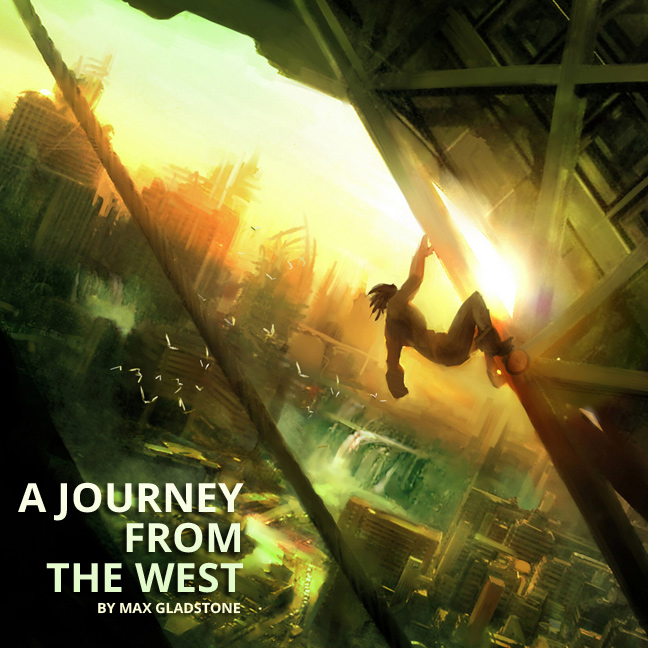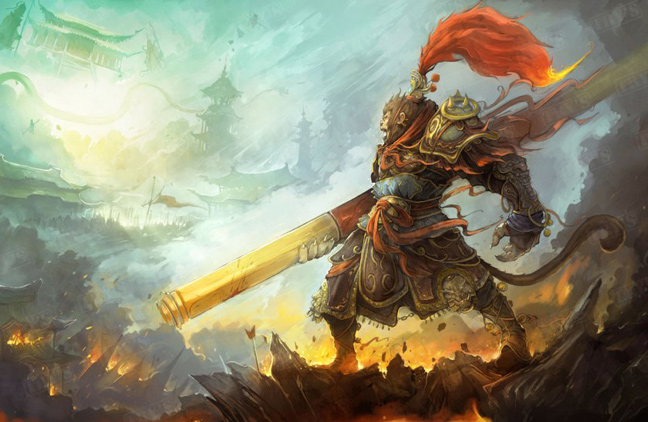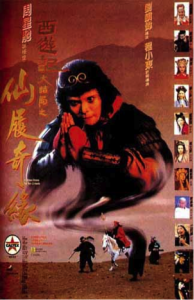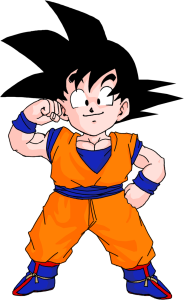
Fantasy should be the broadest genre in existence. Fantasy writers get to create and transform to our hearts’ content. Not even the laws of thermodynamics bind us. Our imaginations are our only limits.
The problem is, the imagination’s limits are often harder than physical law. Writers are formed by experience, and interpret that experience into story using instincts developed reading, and hearing, stories, from early childhood. So, when a lot of Western folks turn to writing fantasy, Arthurian and Greek and Norse myths are the seeds they use to people and structure their imaginative worlds.
Which is fine! Each generation needs to remake the myths received from the previous generation. But sometimes writers and readers feel the limits of their traditions, and wonder, what else is out there, other than kings and earls?
In this three-part series I’m going to be writing about stories I think all fantasy writers and fans should know, other than the standard Celtic, Greek, and Norse sources. If you know these stories already, then good! I hope there’ll be something cool for you here anyway. If these stories are new to you, maybe these few posts will expose you to some amazing worlds.
Who am I?
I am the kind of person who has to resist a powerful temptation to shout ‘24601‘ when asked that question. I am a writer, and I write fantasy novels along with other things. By descent I’m a few centuries of West Virginian Scotts-Irish meets I think ex-English Texan on my mother’s side, and early 20th century immigrant Eastern European on my dad’s side—some of that’s Jewish and some not.
So, what am I doing writing about this subject? My parents are world religion scholars; I grew up reading the books and stories I’ll be talking about in this series, and they all helped me figure out who I was. These stories are all as much a part of me as the Arthur myths. On top of that, I speak, read, and write Chinese, and lived in China for two years plus several summers in between school.
That said, let me introduce to you the coolest monkey in world literature.

Art by ~Walking-Furnace
Journey to the West, or, How Sun Wukong Got His Groove Back
Meet Sun Wukong, alias Stone Monkey King, alias Great Sage Equal to Heaven, alias Protector of the Heavenly Stables, central character of the Ming dynasty Chinese folk novel Journey to the West. In the first seven chapters of this hundred-chapter epic, Sun Wukong rises from more-or-less obscurity to become king of all monkeys on the tropical island of his birth—and then, like any good sovereign, decides to make his subjects immortal, and himself a god. To achieve this goal, Wukong studies hidden Taoist magic, wrestles gods to a standstill, bluffs his way into a dragon palace to steal a weapon used to create the Milky Way, raises an army of demons, and survives alchemical torture intended to reduce him to his component atoms. He defeats death, makes his subjects immortal (sort of) and almost deposes the King of Heaven—only to be stopped by the timely intervention of the Buddha. Cross Coyote with pre-Crisis Superman, and you end up with Sun Wukong.
Just to reiterate: this book has one hundred chapters, and all that stuff I just mentioned, the wars among gods, the demon armies, and so on, takes place in the first seven. At the end of Sun Wukong’s rebellion, the Buddha traps him under an iron mountain for centuries, which is when things start to get really interesting.
See, Journey to the West is based (sort of) on historical events, namely the pilgrimage of a Chinese monk, Xuanzang, to India (that’s what’s meant by the West of the title), to recover Mahayana Buddhist scriptures for the court of China’s illustrious T’ang dynasty. Xuanzang is destined for this purpose: he’s spent thousands of incarnations meditating and preparing. But the journey’s dangerous, and all those incarnations of meditation have made Xuanzang’s flesh very tasty. Any demon that eats him will get instant immortality, and they’re all salivating at the prospect. Pious and peaceful Xuanzang needs disciples, for which read bodyguards.
Fortunately, the Buddha, and his representative, Guan-yin, Bodhisattva of compassion and mercy, know a few warriors in desperate need of redemption—sinners, lovers, and revolutionaries, all willing to risk their lives for a second chance. Chief among these is Sun Wukong. The deal’s simple: if Sun Wukong and his fellow bodyguards get the pilgrim all the way to the Western Heaven, they’re set free.
If this sounds like the plot of an odd-couple road movie, you’re absolutely right. Journey to the West is, on top of everything else, the best odd-couple road movie story of all time. Soon after Sun Wukong signs on to the pilgrimage, he and Xuanzang are attacked by bandits. Wukong, of course, kills the bandits, to the horror of the pacifist Xuanzang, who adheres to a strict pledge of nonviolence. Meanwhile, Xuanzang’s blind faith in humanity often leads to his being captured by demons, from which Wukong must free him. Which situation is made even more complicated by the fact that most of the demons they fight are Wukong’s old war buddies from his rebelling-against-heaven days.
Cosmic kung-fu battles between gods, episodic adventure, humor, philosophy, social satire, wacky hijinks, seduction, fetch quests, shapeshifters, magic, mpreg (yes, you read that right), enlightenment—the Journey to the West has everything, give or take a bit. And I haven’t even mentioned Xuanzang’s other bodyguards: a slightly clumsy river demon who turns out to be a really nice guy after all, a dragon prince disguised as a horse, and the infamous Zhu Bajie, a grotesque, gluttonous, and lustful divine warrior trapped in the shape of a half-man half-pig,
You owe this book to yourself.

Art by aiyayo
How to Read
Journey to the West is absurdly accessible in English translation. If you’re not used to reading Chinese names, you might have a little trouble at first, but since so many characters are gods or demons, most of their names are translated in the major English versions (like “Bull Demon King,” who is exactly what he says on the tin).
That said, after the first twelve chapters, the Journey to the West story becomes very episodic; back in the day, the hundred-plus chapter book was split up into smaller volumes, or told by wandering storytellers one chapter or episode at a time. Like a lot of the great old books (the Tale of Genji for example), it’s better to think of Journey to the West as a long-running comic book or TV series than as a typical novel. If you try to sit down and read all hundred chapters straight through, you may get frustrated. Think of Journey as your favorite episodic TV show, and you’ll be fine.
Anthony Yu’s four-volume translation of the entire novel has been my version of choice for a long time. An engaging prose style for the average reader, and tons of footnotes for scholars and other folks interested in background. He’s just revised his translation for the first time in thirty years—what an opportunity to get on board!
On the other end of the scale is David Kheridan’s retelling. This slim book leaves out huge portions of the story, and focuses on battles and humor. That said, if you’re passingly curious about Journey to the West, it’s a fun option, especially for younger folk. This is the version that hooked me on the Monkey story at age 11.
Somewhere in the middle, Arthur Waley’s abridged translation is a more full-featured representation of the novel than Kheridan’s, in one volume, and has more of the philosophical and religious elements of the full book without sacrificing martial arts battles, humor, and heavenly politics.
And in Pop Culture
Journey to the West and its characters have been huge parts of Chinese culture for hundreds of years, and if Ming dynasty novels aren’t your thing (which, honestly, why not?) or if you’ve already read Journey to the West and want more, there’s plenty of pop culture connected to these characters and their stories! This is by no means an exhaustive list—more of a summary.
Movies!

Journey is a big story to adapt into a movie, but I couldn’t write this article without mentioning A Chinese Odyssey, aka 大记西游. Stephen Chow, of Shaolin Soccer and Kung Fu Hustle fame, stars as the Monkey King; you’ll recognize a bunch of other faces from his movies here as well. The story’s a little twisty, involving reincarnation, time travel, musicals, and spider demon spirits, but it’s also hilarious, and touching. The Chinese Odyssey movies, taken together, are pop culture shibboleths for kids in the PRC; when I taught in Anhui, my students could quote A Chinese Odyssey better than most geeks I know can quote Monty Python and the Holy Grail.
2013 looks to be a good year for film adaptations of Journey also: Donnie Yen, he of the incredibly crisp martial arts choreography, is starring in a Hong Kong film called The Monkey King, and Stephen Chow looks to be revisiting the universe in a new Journey to the West film called Journey to the West: Conquering the Demons. And, of course, there’s the Journey adaptation collaboration between Neil Gaiman, Zhang Jizhong (of whom more below), Guillermo Del Toro, and James Cameron (?), currently brewing. Who knows if this can or will happen, but if I were King of Hollywood, it would.
TV Shows!
I didn’t watch much, really any, TV growing up (yeah, I was one of those kids), so I’m not a good source on this, but the Journey to the West story adapts well to episodic television, and there’s almost always a Journey to the West comedy/drama on Chinese TV. Folks who watched a lot of BBC in the 70s may have seen the TV series Monkey, a translation of a Japanese adaptation of the novel. Zhejiang Satellite TV and Southern Television Guangdong have both produced relatively straight television adaptations in the last two years—the STG version is directed by Zhang Jizhong, a noted director of TV versions of classic Chinese epics. There’s also a Japanese anime/manga/video game transmedia Voltron called Saiyuki, which I haven’t seen, but has lost points with me by virtue of the fact that the bodyguard pilgrims (who are supposed to be fearsome and ugly) all look like slender-faced bishonen. But, you know, c’est la guerre. And, of course, Dragonball (the original, not Z and so forth) was based on Journey to the West. Young Goku, with tail and cloud and staff, is a straight-up adaptation of Sun Wukong, and most of his friends adapt other characters from the novel.
Video Games!
The popularity of this story means that versions of Journey to the West characters show up in the backgrounds of Japanese and Chinese video games about as often as swords in stones and the like show up in Western games, but relatively few video game versions of the story have been released in the States. For that reason it’s impossible for me to be objective about a game like Enslaved: Odyssey to the West, which retells the story with robots instead of demons, and the monk changed to a tech trying to get home to her family. The game gets a lot better if you read in some backstory from the novel that isn’t precisely there (e.g., Monkey used to work for the robots and now works against them, etc.). Andy Serkis does a wonderful job as the actor (mo-cap & voice) behind the protagonist, as does Lindsay Shaw as Tripitaka / Xuanzang. Yahtzee didn’t like the game, but Yahtzee’s Yahtzee, and we wouldn’t want him any other way.
Wow.
Okay, time to take a deep breath. I didn’t plan for this to be such a long read when I started, but I care a lot about this story, and I hope I’ve managed to give some sense of how much there is to Journey to the West, how cool the story is, and how other folks have drawn from it for hundreds of years. If you haven’t discovered Journey to the West before, track down one of the translations, abridgements, or adaptations above. You won’t be disappointed, unless of course you don’t like magical martial arts epics featuring philosophy, alchemy, bromance, and brilliant slapstick comedy. There must be some of you out there. Perhaps you’re all members of the same club.
It must be a very boring club.
Meanwhile, I’ll be over here chilling with the Monkey King.


I recall a movie (tv movie perhaps) with an American living in China (played by the guy from Dharma and Greg), who wound up transported into the world of theMonkey King’s story. He was remarkably genre savvy, and realized just what he was in for and immersed himself in the story.
Oh, yes, The Last Empire I think was the name. Never seen it—worth checking out? Sun Wukong also shows up in Big Bird in China, which I can’t believe I left out of this essay in retrospect. Who’s flying this thing?
Err, you are. I think Last(Lost?) Empire sort of works in the same way Forbidden Kingdom does for Wuxia–an introduction moderated for American audiences, with more authentic and deeper stuff out there, afterwards.
I think I need to rewatch Last Empire again and see if it holds up…
Good idea. If I have a free night I might give it a run—though I’m far behind on recent proper wuxia, too.
[…] In other news, Max Gladstone is appearing over at A Dribble of Ink with an essay on non-Western fantasy inspirations. […]
I haven’t read all of the Saiyuki manga, but it’s a lot more twisted and fun than the bishonen depictions imply. Of course there are vast departures from the original, like that the monk is not at all a pacifist when it comes to demons attacking him.
Did you ever see the movie The Forbidden Kingdom with Jackie Chan and Jet Li? It was kind of hilarious, though not necessarily for the right reasons.
Monkey King also shows up (played by Jet Li) in Forbidden Kingdom, which was a fun family movie in which Jet Li and Jackie Chan duke it out. (Jackie Chan plays a Buddhist Immortal. The white kid gets the lesson of the movie and becomes a great martial artist, but if you just accept that that’s its trope, it is made of fun.)
Also: brilliant comic American Born Chinese by Gene Luen Yang draws heavily from this story, and if you haven’t read it, Max, go drop everything and pick it up from your local library, because you will love it.
Love your recap of the story here, and am glad for the translation advice! I picked up a public domain e-book copy years ago and haven’t actually read it (insert shame-faced expression here), so I’ll reconsider my translation before jumping in. :)
Casey – Sounds like I should at least give Saiyuki a chance. There were definitely moments reading the original Journey where I wished Xuanzang would stand up for himself at least a *little*. Sounds like the manga at least would be good clean fun.
Never saw Forbidden Kingdom. Should I add that one to the queue? Fun to see Jackie Chan and Jet Li on the same screen at the same time, if nothing else…
Alana—That makes two votes for Forbidden Kingdom, I guess! I’ll also push American-Born Chinese to the front of the docket. You’re the second person to recommend it in equally glowing terms. And, definitely check out Yu. I don’t know the public domain translation, but I’m wary (probably more than I should be) of gussied-up translations.
What a fantastic feature! I definitely feel like fantasy needs to pull from different sources, but the thing is, there’s plenty already available. Thanks for sharing!
My pleasure!
I love recommendations like this! I’ve been immersed in Howard Andrew Jones’s Arabian tales and I’ve got my sights set on India-based “The Immortals of Meluha”. As someone who spent a year immersed in Korean culture, I had the opportunity to visit some magnificent Buddhist temples, and I think this would interest me greatly. I know I’ve heard of Journey to the West, but I seem to have let it fall through the cracks. Another reason to like it would be due to my fondness for Bridge of Birds by Barry Hughart. Thanks Max!
Apropos of this, Shirt.Woot is featuring Sun Wukong this week.
http://shirt.woot.com/offers/sun-wukong-remix-pullover-hoodie
http://shirt.woot.com/offers/sun-wukong-remix
[…] has a fantastic guest post talking about “the coolest monkey in world literature,” Sun Wukong, alias the Stone Monkey […]
This was a great read! Being a bit of a Japanophile, I have seen the 2007 movie Saiyuuki (http://www.imdb.com/title/tt0938281/). Although, I wouldn’t really recommend it…
[…] Gladstone’s guest post at A Dribble of Ink, the first in a short series called “Broader Fantasy Foundations”, highlights the […]
There’s actually an older PS1 game called Saiyuki:Journey West that serves as the poor man’s Final Fantasy Tactics; it’s an amazing game, and does a good job of condensing the plot into a manageable video game.
The Chinese name of Stephen Chow’s movie ” A Chinese Odyssey” is 大话西游,not 大记西游。
[…] last two iterations of this column have played it safe. I’ve read Journey to the West in two languages and studied it from a variety of angles, and Romance of the Three Kingdoms, too […]
Thank you. Thank you so much for this essay. It is good to know that I am not the only fantasy writer looking to draw inspiration from non-Western lore. My own novel-in-progress is deeply inspired by Chinese tales like “Journey to the West” and “Romance of the Three Kingdoms.” 我也学过汉语,在中国呆了一年,可是我怕我的汉语水平还不够,看《西游记》、《三国演义》的中文版一定看不懂,哈哈。